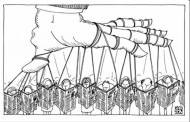
A woman waits for a bottle of milk to be dispensed at a vending machine in Larissa town, central Greece June 26, 2014. REUTERS/Yorgos Karahalis
(Reuters) – Grassroots movements to cut out middlemen have been on the increase since Greece’s debt crisis exposed the country’s Achilles heel – a bureaucratic system which stifles innovation and encourages corruption.
One of the most successful is based in Larissa, near the demi-God’s legendary birthplace. The town’s new vending machines, have, on a small scale, solved a problem Greece’s leaders and their international backers have tried and failed to tackle.
They dispense not snacks or soda, but milk, supporting farmers while undercutting prices that have defied economic logic to remain some of the highest in the European Union.
Greeks, whose average incomes fell by 30 percent since the crisis hit in late 2009, have been flooding in – bringing their own bottles or buying plastic or glass ones from the machines.
“People were waiting 20 to 30 minutes in line, to buy milk!” said Constantine Gougoulias, 37, general manager of the dairy cooperative behind the initiative, describing the response on the day the machines were set up. “We were telling them, ‘Hold on, we need to fill the machines first’.”
Today ThesGala or “Want Milk?” has expanded to 14 vending machine outlets in Larissa and plans to double the network in and around the central city over the next year.
Sales from the blue and white machines account for a small fraction of the cooperative’s milk output, but they show how crisis has encouraged entrepreneurship where self-interest has a social twist in a country where bureaucracy stifles development.
Most of those efforts have been informal, relying on word of mouth and loosely organized at the outskirts of towns and cities.
In 2012, for example, potato farmers began selling their produce directly to consumers at parking lots outside towns in northern Greece to cut out the supermarkets who they accused of hurting both producers and consumers.
Since then, the movements have expanded beyond potatoes – in Kozani in the north and the central town of Volos, for example, people have formed groups selling anything from flour to cleaning products.
“We have seen an increase in social solidarity and cooperation in Greece – we didn’t have this before,” said Fiori Zafeiropoulou, a lecturer in social entrepreneurship at Athens’ City Unity College.
“This is the positive element of the financial crisis.”
The supermarkets have denied accusations they are exploitative middlemen, saying the crisis has hit them too. Greek dairy firm Olympos, which buys milk in bulk from small producers, says it is not threatened by movements like ThesGala and welcome initiatives like the milk vending machines.
It dismisses criticism that companies like it are to blame for high milk prices, saying Greece’s high transport costs and regulation make it impossible to compare to other EU nations.
FAILED REFORM
The European Union and International Monetary Fund bailing out Greece have long pressed Athens to cut out restrictive licensing procedures and excessive regulation, which they blame for driving up prices in Greece and choking the economy.
Milk was among the industries that the EU and IMF have cited as in need of liberalization. But it has also proven to be a sector stubbornly resistant to change – indeed, milk prices have risen more than 12 percent in four years even as the deepest post-war recession drove prices down over the past 16 months.
Among the reasons, economists say, are high mark-ups by retailers and high transport and distribution costs in a nation of mountains and islands, all factors that leave farmers with little benefit.
According to a report released by the Organization for Economic Cooperation and Development last year, the difference between retail and producer prices for milk in Greece is 35 percent higher than the EU average.
The OECD also blamed milk labeling restrictions aimed at protecting Greek farmers. Whereas EU rules leave the shelf life of pasteurized milk to the discretion of producers across the bloc, Greece until recently “fresh”, pasteurized milk could have a maximum shelf life of five days.
The OECD’s recommendations, urged upon Greece by its international lenders, argued that the five-day rule should be scrapped since it made cheaper imports next to impossible and raised production costs, because lots of milk went unsold, returned by supermarkets to the producers.
In response, Prime Minister Antonis Samaras’s ruling coalition this year tried to liberalizes the milk market by lengthening the “fresh milk” period to 11 days. The reform was met with protests from farmers fearing a wave of cheap imports and prompted a deputy agriculture minister to quit.
Forced to row back, the government instead introduced two new milk categories – one with a shelf life of two days and another with seven days and scrapped the “fresh” milk label.
But the two-day extension has so far done little to boost imports, and retail prices have yet to come down.
“So what was the result? The prices did not fall, not even by a cent,” Maximos Harakopoulos, the former deputy agriculture minister who quit in protest at the reform told the Eleftheros Typos daily last month, calling the episode a “fiasco”.
A EURO A DAY
ThesGala, on the other hand, is counting its successes. The cooperative’s 130 tonnes of daily milk production accounts for only about 10 percent of milk produced in Greece, and only seven percent of it is sold from machines, but members of the cooperative expect that to grow fast.
Even if the group’s primary objective was to ensure stable prices for producers, it also “wanted to prove that quality milk can be sold cheaply in Greece,” said the cooperative’s president, Thanassis Vakalis, 40, asserting they had outdone the European Commission, European Central Bank and International Monetary Fund “troika” supervising Greek reforms.
“It appears that we succeeded where the troika and the government failed even though we are just a few people,” he said.
ThesGala’s success is a boost to small dairy farmers like Andreas Karafyllis, a former software developer who returned home from Germany in 2006 to start a farm. He nearly went out of business in 2009 when the prices paid to producers fell at least six cents a liter below the cost of production.
Karafyllis says retailers were squeezing out consumers with high prices and producers with low prices.
“The blame isn’t with producers – it’s on everyone above them,” he said one afternoon as he walked through his farm near Larissa as cows munched on hay near oleander blooms.
ThesGala pays farmers 45 cents a liter, giving Karfyllis a more stable and lucrative income from his 120 cows and 80 small calves. Unlike other ad-hoc farm movements, the cooperative publishes yearly financial statements and is taxed beforehand on milk delivered, meaning it does not contribute to Greece’s vibrant black market economy.
On a recent summer evening, a steady stream of people – from young couples to fathers with toddlers in tow – drove up to a milk machine near the town center and stuck glass bottles under a spout that poured down frothy milk for 90 cents per liter. The average price of milk stands at 1.28 euros per liter in Greece.
“It’s the best quality and I save a euro a day,” said Ioannis Pavlidis, 40, a school bus driver who buys two liters a day for his two daughters. “The effort is commendable.”
(Writing by Deepa Babington; editing by Alessandra Galloni and Philippa Fletcher)

Cows are seen at a milk farm in Larissa, central Greece June 27, 2014. REUTERS/Yorgos Karahalis

A cow eats at a milk farm in Larissa, central Greece June 27, 2014. REUTERS/Yorgos Karahalis

Andreas Karafyllis, a former software developer who returned to Greece from Germany in 2006 to start a milk farm, pets a calf in Larissa, central Greece June 27, 2014. REUTERS/Yorgos Karahalis



















